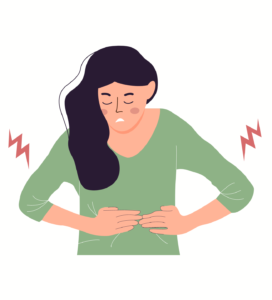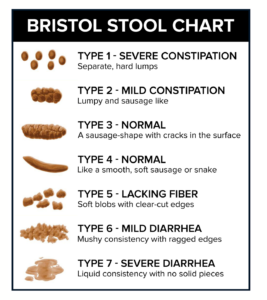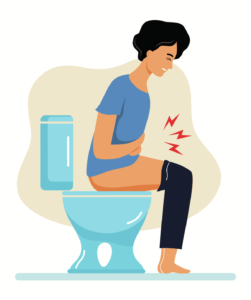We have dealt with the top end, but what about the back end? Today we are talking about mitigating 2 other common side effects, constipation and diarrhea, that can occur with the GLP-1 receptor agonists such as Ozempic and Saxenda.
Am I saving the best or shittiest for last? Not really, these side effects just happen a little less frequently, at least that is what I find in practice, compared to nausea and heartburn. I have also grouped these two together as the management is similar in a lot of cases.
Now we all obviously enjoy a satisfying poo. Nothing quite like feeling cleaned out at least in a controlled manner. Either not going enough or going too much can certainly lead to some unpleasantness. Unfortunately, as the GLP-1 medications can affect how quickly the GI tract moves food along, they can obviously lead to some of the above issues. Before we dive into how we manage those side effects, let’s talk about what constipation and diarrhea actually are.
What is Constipation?
 As my mother would say, ‘it is when you are full of sh*t!’ She certainly is not wrong in that regard but the more specific medical description would be as follows. It is a condition in which a person has uncomfortable or infrequent bowel movements. These movements are happening 3 times a week, or less than their usual number of movements, and the movement often involves small amounts of hard, dry stool. Or based on the Bristol Stool Chart, it would be considered a Type 1 or Type 2.
As my mother would say, ‘it is when you are full of sh*t!’ She certainly is not wrong in that regard but the more specific medical description would be as follows. It is a condition in which a person has uncomfortable or infrequent bowel movements. These movements are happening 3 times a week, or less than their usual number of movements, and the movement often involves small amounts of hard, dry stool. Or based on the Bristol Stool Chart, it would be considered a Type 1 or Type 2.
Before you say anything, yes, there is actually a chart with the 7 most common types of poops that people may have. And yes we do use this as a tool in medicine.
I am not sure if someone used their own poop as a reference for each type, or if they looked at the poo of many others. Either way, it would have been a shitty job, pun fully intended.

Other than small, hard, and infrequent bowel movements, other possible side effects may be straining to go, belly bloating and discomfort, a sensation that not everything came out, and some people do note nausea or early satiety because things are just not moving through very quickly.
Most often constipation is not harmful, however, it can be harmful if you are experiencing a significant amount of bloating and severe pain when you try to have a bowel movement or your bowel movements have dramatically changed, or if there is blood in your stool. As an aside, if there is blood coming out of an orifice on your body where it shouldn’t be, you should probably follow up with your doctor.
What about diarrhea?
 Well as everyone has likely experienced, diarrhea is the opposite of constipation. Fun fact – sometimes constipation can lead to diarrhea in a condition called overflow diarrhea. This is where your poo is so hard and can’t be passed that your bowel starts pushing watery poop around the hardened poop. Yeah… how’s that for imagery?
Well as everyone has likely experienced, diarrhea is the opposite of constipation. Fun fact – sometimes constipation can lead to diarrhea in a condition called overflow diarrhea. This is where your poo is so hard and can’t be passed that your bowel starts pushing watery poop around the hardened poop. Yeah… how’s that for imagery?
Diarrhea can be loose or watery stools that may or may not include an increase in bowel movement frequency, so a Type 6 or Type 7 on the Bristol Chart. There might also be some abdominal cramping and pain, nausea, and in more severe cases, as well as depending on the cause, fever and possibly blood in your stool.
Again, in most situations, diarrhea is not harmful and will resolve on its own a few days after spicy Taco Tuesday. If you are becoming dehydrated, have a fever, have blood in your stool, or think your tacos might have had something extra, please follow up with your care team!
How do we manage diarrhea and constipation due to the GLP-1 medications?
First and foremost, knowing that you might experience some constipation and/or diarrhea when using medications such as Ozempic/Wegovy and Saxenda is our first step. What you are experiencing is normal and OK. As I have said in previous posts, these side effects will be mild for a majority of people and will resolve as your body becomes used to the medication!
However, here are a few things you can implement in your day-to-day to help with constipation and diarrhea if they do occur:

- Fibre – most people don’t consume enough fibre on a daily basis. This means more veggies and high-fibre foods. You can even consider a fibre supplement such as Metamucil. This goes for diarrhea as well. If you are experiencing diarrhea, fibre can help to bulk up your stools and make them less watery. Even after your constipation and/or diarrhea resolves, keep up with the fibre. There is nothing but health benefits to follow!
- Water! This goes with the above but also in general. Water, as you might have guessed, helps to lube things up when we have constipation but it also helps to prevent dehydration if you experience diarrhea. Plus water is good for you and your body’s optimal functioning!
- Avoid any foods that may have caused you to experience constipation or diarrhea in the past. If they did it before, they may do it again!
- Probiotics – I haven’t reviewed the literature around probiotics in detail for quite some time. A number of years ago the evidence was limited, however, now it seems that they wouldn’t be a bad thing, in particular, if you have comorbid IBS. Probiotics can help to keep all systems in balance! I don’t have specific recommendations at present but I have heard people do well with Align and Bio-K. Stay tuned for a future video!
- When it is time, set it free. This more has to do with constipation, but when you notice it is time for a bowel movement, let it happen. We want to help your body’s biofeedback work properly – if the urge is there and you go, the signal and process are reinforced. If you hold it, your signal for the urge to poop can become dampened down.
- Exercise. Again, more for constipation but plenty of activity is great for good bowel health. When we exercise it helps to contract the muscles around our intestines and well, keep the poo trucking along! So being sure to stay as active as possible; it will do nothing but good things for you.
What about medications?
 Again my disclaimers: This is for informational purposes only. This is not the ideal situation as there are risks associated with taking another medication however, in the short term while your body adapts to the GLP-1 RA, it can certainly be considered. Of course please follow up with your care team for specific advice on your given situation as to what agents might be best for you to manage constipation or diarrhea.
Again my disclaimers: This is for informational purposes only. This is not the ideal situation as there are risks associated with taking another medication however, in the short term while your body adapts to the GLP-1 RA, it can certainly be considered. Of course please follow up with your care team for specific advice on your given situation as to what agents might be best for you to manage constipation or diarrhea.
For constipation, we can consider laxatives. Usually starting with Restoralax for a few days is our initial step, and then stepping it up to things like Sennakot or glycerin suppositories if something with a bit more punch might be needed to get things moving.
For diarrhea, I strongly encourage the addition of fibre first and ensuring that your diarrhea is not in fact overflow diarrhea – a conversation that should involve your doctor! Most people would likely jump to Imodium, however, we want to use caution with Imodium as it works by slowing down the movement of the GI tract, which the GLP-1 RAs are already doing. So the combination of the two might lead to slowing it down too much and ultimately cause a blockage. Therefore, it is key to talk with your doctor before using this and any other additional medications! Kapeesh?
—
We have essentially covered the most common side effects an individual might encounter when taking these weight-loss medications! I hope this was helpful, and as a final point, sometimes the side effects of these medications are too great and the best decision is to stop taking the offending agent. And that is OK! There are other agents and other supports out there to help you along your weight management journey.
Don’t forget to check out my free webinar on weight-loss medication and everything you should know!
Until next time always remember small tweaks lead to massive peaks.






